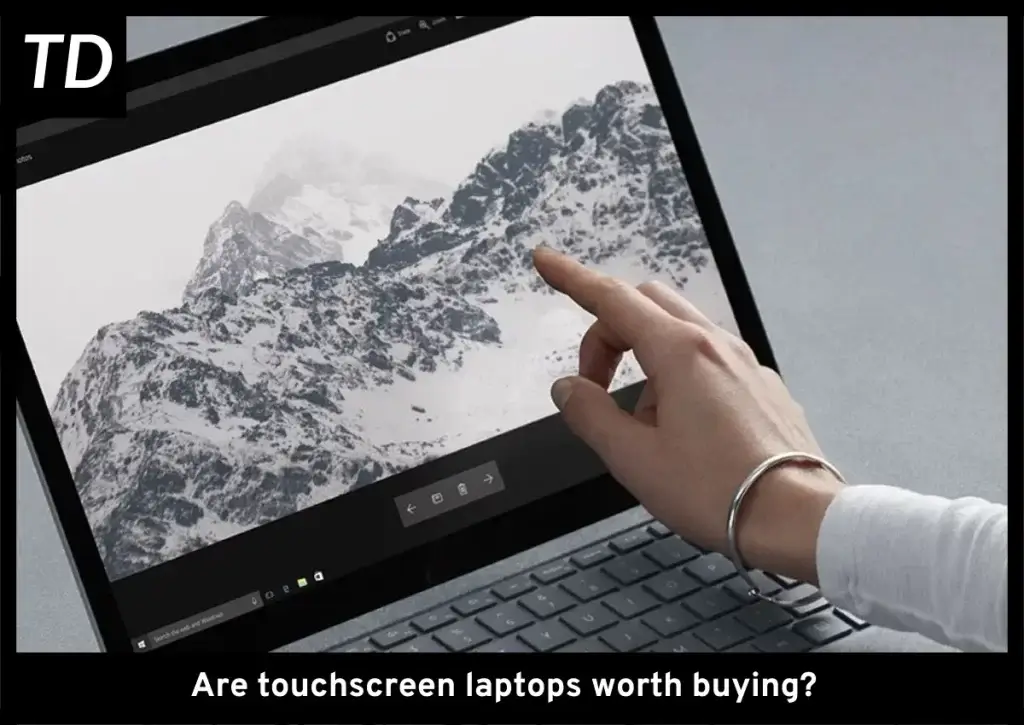So you are out shopping for a laptop and considering buying a touchscreen one. Getting a touchscreen laptop has its own perks that traditional clamshell laptops simply do not offer.
But at the same time, they also have some downsides you should be aware of. To help you make an educated purchasing decision, we have summarised some advantages and disadvantages of using a Touchscreen laptop.
Advantages of a Touchscreen Laptop
Easier to navigate and use the OS
Touchscreen laptops offer a more intuitive way to interact with your computer’s operating system, allowing you to navigate menus, open and close windows, and interact with apps with the touch of a finger. Using gestures like pinch to zoom and swiping around is way more convenient and easy on a touchscreen.
Touchscreen laptops can be especially helpful for users who are used to using touchscreens on their smartphones or tablets, as it provides a more seamless transition to a larger screen.
Great for creative work
For artists, designers, or anyone who needs to work with visual media, a touchscreen laptop can be an excellent tool. With a stylus or finger, you can draw, sketch, or manipulate images more naturally than with a mouse or touchpad. This can lead to more precise and accurate results and a more organic feel to the creative process.
It can be used with a stylus
A stylus can be a great addition to a touchscreen laptop, allowing you to take handwritten notes, sketch, or navigate more precisely than with your finger alone.
This can be especially helpful for users who need to take detailed notes or draw diagrams, as it provides a more natural and accurate way to interact with the computer.
However, remember that the stylus quality and the input lag vary from laptop to laptop, so your mileage may vary depending on the type of laptop you buy.
You can use the on-screen keyboard
If you don’t want a physical keyboard, a touchscreen laptop lets you use an on-screen keyboard instead. This can be especially useful if you’re using your laptop in tablet mode or need to type in a language that doesn’t use a traditional keyboard layout. It also eliminates the need for a physical keyboard, making the laptop more portable.
Better for annotating and notetaking:
With a touchscreen laptop, you can easily highlight, underline, or circle text in documents, making it a great tool for students, researchers, or anyone who needs to take notes or mark up texts. This can be especially helpful for studying or research, as it lets you keep all your notes and annotations in one place.
Or, if you are someone like a teacher who often highlights and annotate assignments and sends them back to students, a touchscreen laptop may be the best for you.
Disadvantages of a Touchscreen Laptop:
Laptops with touchscreen are heavy
Adding a touchscreen to a laptop can add weight, making it less portable and cumbersome. Due to this, many convertible touchscreen laptops are quite heavy in tablet mode compared to iPad.
This can be a drawback for users who need to take their laptops with them on the go or prefer a more lightweight option.
If you plan to use your laptop mostly in tablet mode, then go with an iPad, or if you want to stick with Windows, then go with something like the Microsoft Surface Pro 9, a full-fledged Windows PC inside a tablet form factor.
They are expensive
Touchscreen laptops are more expensive than their non-touch counterparts due to the added cost of touchscreen hardware and technology. As you might expect, this makes touchscreen laptops relatively more expensive than traditional laptops. Also, if you end up damaging the screen on your touchscreen laptop, it would cost more to repair it.
It can be comparatively fragile
Touchscreens can be more fragile than non-touch displays and are more susceptible to cracking or scratching if dropped or mishandled. This can concern users who need a durable laptop that can withstand frequent use and travel. So if you buy a touchscreen laptop, be extra careful with them.
Comparatively have worse battery life:
Though battery performance has improved over the years and the gap has become smaller between touch and non-touchscreen laptops in terms of battery life, touchscreen laptops can still relatively drain faster.
However, it’s one of those downsides that are not a big deal anymore, considering how battery life has improved in laptops over the years.
Ergonomics are worse compared to a tablet
While a touchscreen laptop can be useful in certain situations, it’s not always the most ergonomic option. For example, if you’re using your laptop for extended periods of time or doing a lot of typing, you may find that a tablet or traditional laptop with a keyboard and touchpad is more comfortable to use.
This can be especially hard because on-screen keyboards are stretched out on display, making them harder to use than traditional typing on touchscreens.
Furthermore, as discussed earlier, laptops are heavy in tablet mode and can become quite uncomfortable in extended use.
Hard to find high-performance touchscreen laptops
Most touchscreen laptops come with efficiency-focused processors and lack dedicated GPUs, which are essential in demanding workloads. Though touchscreen laptops exist with dedicated GPUs, they are quite limited regarding options.
But if you plan to look for a laptop with the highest-end Intel HK processor or an 80 series RTX GPU, you are out of luck.
Conclusion: Should you get a touchscreen laptop?
If you enjoy using touchscreens, do a lot of creative work, and often use your laptop in bed, then I can comfortably recommend a touchscreen laptop.
However, if you plan to occasionally use the touchscreen while using the keyboard and mouse as your primary input method, then I can still recommend the touchscreen laptop.
Remember the downsides of owning one and that your options might be limited compared to regular laptops.

